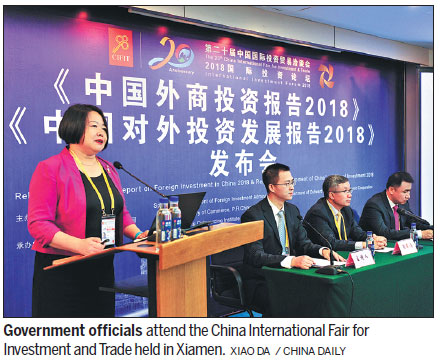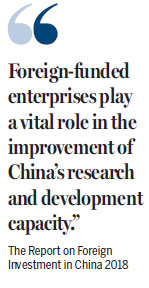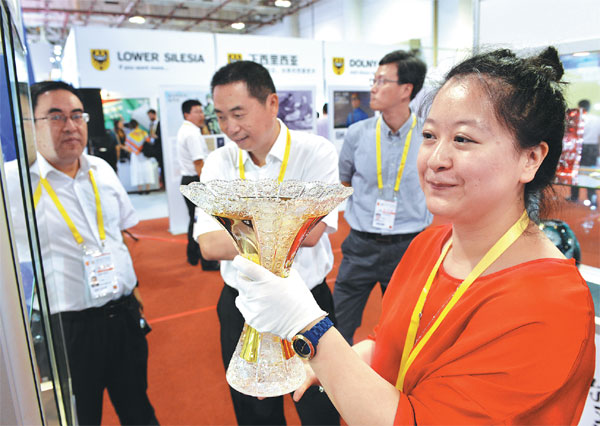Report highlights Chinese foreign investment
Opening-up paying dividends at home and abroad, Cao Yingying reports.
The Report on Foreign Investment in China 2018 was released on Sunday during the China International Fair for Investment and Trade held in Xiamen, Fujian province.
Zhang Xingfu, deputy director-general of the Department of International Trade and Economic Affairs at the Ministry of Commerce, said that while facing complicated domestic and foreign situations last year, China has followed the road of opening-up and continuously improved the management systems and working mechanism for foreign investment.
|
A booth for the Czech Republic featuring a photo of an elegant cafe in Prague attracts many visitors at this year's China International Fair for Investment and Trade held in Xiamen. Wu Xiaoping / For China Daily |


|
A crystal ware produced in the Czech Republic draws attention during this year's China International Fair for Investment and Trade. Wu Xiaoping / For China Daily |
Zhu Bing, deputy director-general of the Department of Foreign Investment Administration at the ministry, said that global external direct investment growth is weak and that international competition for attracting foreign investment has intensified.
Under these circumstances, China's foreign direct investment hit $136.32 billion in 2017, an increase of 2 percent compared with 2016.
Nonfinancial outbound direct investment reached $131.04 billion.
The utilization of foreign capital has developed well and made steady progress, Zhu said.
According to statistics from the ministry, China's outbound direct investment stood at $124.63 billion last year, third highest in the world behind the United States and Japan.
The United States, Australia, Singapore and the Netherlands are the main investment destinations for China's outbound investment.
The report said that foreign investment in China mainly came from the service industry in 2017.
The countries involved in the Belt and Road Initiative remain priority destinations for China's outbound investment.
A total of 59 countries along the BRI were invested in by China last year, amounting to $14.36 billion.
Following a guidance released by the central government in 2017 restricting the fields for outbound investment, no new projects in real estate, sports or entertainment have been set up. As a result, more investment has been directed toward chemicals, power generation and manufacturing.
Last year, the East, Central, West and Northeast regions respectively accounted for 74.7 percent, 8.5 percent, 13.1 percent and 3.7 percent of China's outbound investment, respectively.
Chinese outbound investment has accelerated the construction of overseas economic and trade cooperation zones, according to the Ministry of Commerce.
A total of $5.79 billion was invested in economic and trade cooperation zones in 2017.

The imports and exports of foreign-funded enterprises in China totaled $1.84 trillion in 2017, an increase of 9 percent compared with 2016.
Those imports and exports accounted for 44.8 percent of China's total foreign trade last year.
"Foreign-funded enterprises play a vital role in the improvement of China's research and development capacity," the report said.
Global top cross-border enterprises have established R&D centers, trained research workers and sponsored research projects in China to encourage technological innovation and entrepreneurship.
Foreign-funded enterprises have also promoted industrial upgrades in the auto industry, light industry and in retail trade.
Long Guoqiang, vice-president of the Development Research Center of the State Council, said in the report that China is facing the challenges of absorbing foreign capital under the new situation.
International competition to absorb cross-border direct investment is becoming increasingly fierce and the uncertainty of China's external economic and trade environment has increased, which has made it more difficult to attract investment, Long said.
However, Long wrote in the report that focusing on the opening-up of the service industry, China has expanded the accesses to foreign capital. China should create a legal and market-oriented business environment based on equal competition between domestic and foreign capital, and play the role of an open platform with special economic zones, economic and technological development zones, and free trade zones.
Contact the writer at caoyingying@chinadaily.com.cn
(China Daily 09/11/2018 page15)
















